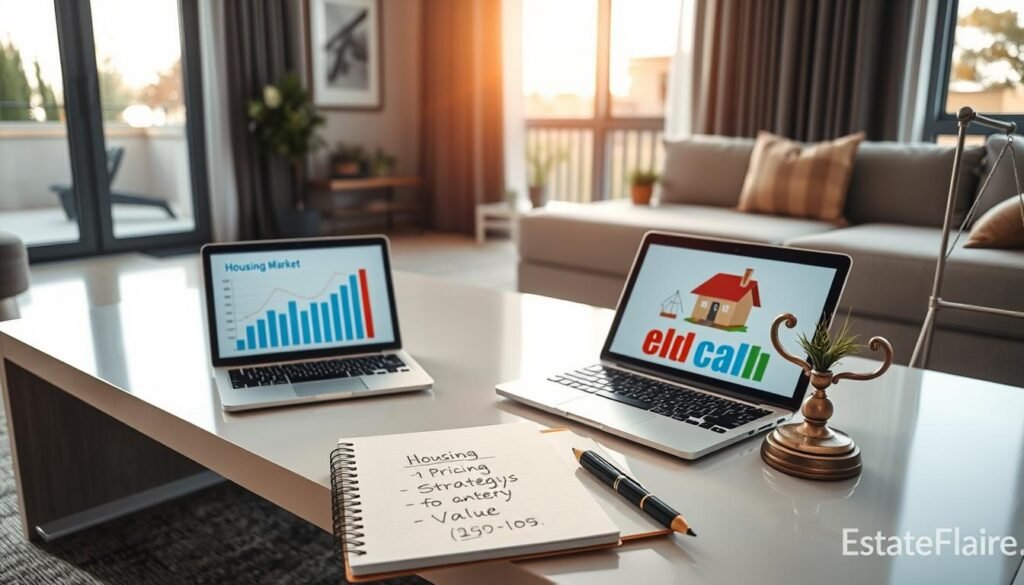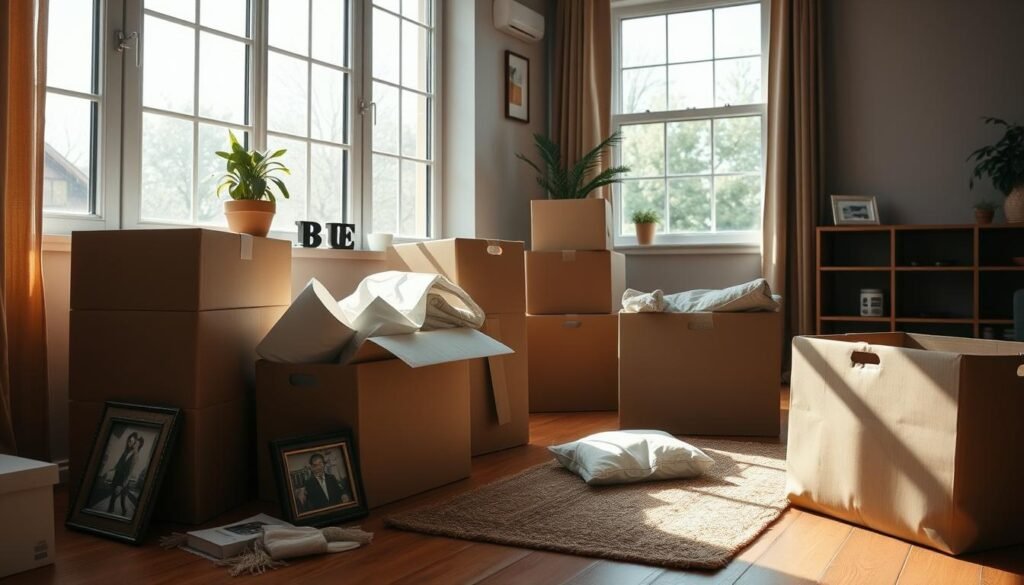We’ll share expert home selling tips to help you sell your home for the best price. We’ll cover everything from getting your home ready to closing the deal. Our strategies will make your sales faster and more profitable in today’s market.
Key Takeaways
- Effective strategies for preparing your home to attract buyers
- Proven pricing techniques to position your home competitively
- Proven marketing tactics to create a compelling online presence
- Proven negotiation tactics to get the best deal for your home
- Insight into the closing process and transitioning out of your home
Preparing Your Home for Sale
Getting your home ready for sale is more than just a sign. You need to declutter, depersonalize, and boost curb appeal. These steps make your home welcoming and attractive to buyers.
Decluttering and Depersonalizing
Start by decluttering and depersonalizing. Decluttering means getting rid of extra stuff and organizing. It makes your home feel clean and open. Depersonalizing means removing personal items. This lets buyers see themselves in the home, not just visiting yours.
Enhancing Curb Appeal
First impressions matter when selling your home. Curb appeal is how your home looks from the outside. It’s key to making a good first impression. To improve curb appeal, do the following:
- Maintain a neat lawn and trim plants
- Keep the outside of your home clean and fixed
- Add flowers or plants to welcome visitors
- Update or repaint the front door
- Clean and fix the driveway and walkways
By focusing on these areas, you’ll make your home look great. This will attract buyers and help sell your home.
| Home Preparation Checklist | Benefits |
|---|---|
| Decluttering and Depersonalizing | Allows buyers to envision themselves in the home, creates a clean and inviting atmosphere |
| Enhancing Curb Appeal | Makes a great first impression, showcases the property’s best features, and increases buyer interest |
“Preparing your home for sale is like setting the stage for a theater performance – you want to create a scene that captivates the audience and leaves a lasting impression.”
Pricing Your Home Competitively
When selling your home, setting a competitive price is key. It attracts buyers and helps you get the best sale price. To find the right price, you need to research the local market, look at similar sales, and use smart pricing strategies.
Understanding the market is crucial. Look at recent sales of similar homes nearby. Consider size, condition, and location. This helps you price your home right, making it appealing to buyers and showing its true worth.
Also, check out the real estate marketing scene. It shows what buyers want in your area. Knowing the latest trends helps you price your home to stand out and attract lots of interest.
| Pricing Strategy | Potential Benefits |
|---|---|
| Pricing slightly below market value | Generates higher number of showings and increases chances of multiple offers |
| Pricing at market value | Attracts serious buyers and maintains a competitive position in the market |
| Pricing slightly above market value | Allows for negotiation room and potential to achieve desired sale price |
With a smart pricing strategy, you can market your home well. This attracts the right buyers and helps you get the best sale price. The secret to a successful sale is finding the right price that shows your home’s value.

Home Selling Tips: Creating a Compelling Listing
In today’s digital world, your online real estate marketing is key to drawing in buyers. To sell your home, you need a listing that shows off its best sides. High-quality photos and a catchy description are crucial.
High-Quality Photography
First impressions are everything, and photos are often the first thing buyers see. Professional photos can make your home look amazing. Show off its special features, like architectural details and big rooms.
Crafting an Engaging Description
A good description can grab buyers’ attention. Write a story that highlights your home’s best points. Talk about its character and what makes it unique.
Make your listing informative and inspiring. With great photos and a compelling description, you’ll draw in more buyers. This can lead to a successful sale.
| Key Elements for a Compelling Listing | Benefits |
|---|---|
| High-Quality Photography | Enhances the visual appeal of your home, creating a lasting first impression for potential buyers. |
| Engaging Property Description | Showcases your home’s unique features and highlights the lifestyle it can provide, inspiring buyers to take action. |
“A picture is worth a thousand words, but a well-written description can make those words come alive.”
By using professional photos and a great description, you’ll create a listing that grabs attention. It will encourage buyers to visit and move forward with the sale.
Staging Your Home for Success
Home staging can greatly impact your home’s sale. It attracts buyers and lets them see themselves living there. By arranging furniture and lighting, you highlight your home’s best points.
Furniture Arrangement
Arranging furniture well is key for staging. First, declutter and remove personal touches. This lets buyers imagine their own items in the space. Group furniture to make cozy areas and keep paths clear.
Think about how furniture moves buyers through the room. This helps them see the space’s potential.
Lighting and Ambiance
Lighting sets the mood in your home. Open curtains to let in natural light. Use lamps to add warmth and welcome.
Dimmers help adjust the light for different moods. This makes areas feel more intimate.
Other ambiance elements like flowers or music also matter. They add to the sensory experience and invite buyers in.
| Home Staging Tip | Description |
|---|---|
| Furniture Arrangement | Strategically arrange furniture to create a natural flow and highlight the best features of each room. |
| Lighting and Ambiance | Use a combination of natural and artificial lighting to create a warm, inviting atmosphere. |
Home staging aims to let buyers see themselves in your home. Focus on furniture, lighting, and ambiance. This makes your home appealing and emotionally engaging, boosting sale chances.

Real Estate Marketing Strategies
Effective real estate marketing is key to finding the right buyers. It highlights your home’s unique features. Today, a strong online presence and social media are powerful tools for marketing.
Online Presence
Having a strong online presence is crucial. List your home on top real estate sites with great photos and a compelling description. Also, create a website or landing page for a detailed home overview.
Leveraging Social Media
Social media is a great way to reach many potential buyers. Use Facebook, Instagram, and Twitter to show off your home’s features. Share photos and videos, and interact with your followers. Use ads and partner with influencers to get more people talking about your listing.
| Marketing Channel | Potential Benefits |
|---|---|
| Real Estate Websites | Increased visibility, targeted audience, comprehensive listing details |
| Social Media | Broad reach, engaging content, targeted advertising, influencer partnerships |
| Dedicated Website | Customized branding, detailed property information, lead generation |
By using online presence and social media wisely, you can make a strong marketing plan. It will showcase your home well and attract the right buyers in today’s digital world.
Navigating the Open House Process
Hosting a successful open house is key in selling your home. It lets you show your property to many potential buyers. This can spark their interest in your home. Here are some tips to help you make the most of your open house.
Preparing for the Open House
Before the open house, make sure your home is spotless. Clear out clutter, deep clean, and stage your rooms to feel welcoming. Also, improve your home’s look from the outside. A good first impression can really help your open house succeed.
Promoting the Open House
Get the word out about your open house through different channels. Use your real estate agent to make attractive signs, online ads, and social media posts. Ask neighbors and friends to help spread the news. Word-of-mouth can draw in interested buyers.
Managing the Open House Event
When visitors arrive, welcome them warmly and be ready to answer questions. Offer materials like a fact sheet to help them learn about your home. Keep everything tidy and organized to show a positive and professional vibe.
Gathering Feedback
After the open house, collect feedback from guests. This can tell you a lot about your home’s appeal and what you can improve. Work with your real estate agent to review the feedback and plan your next steps.
By following these tips, you can make your home more visible, connect with interested buyers, and get valuable feedback. This will help you sell your home more effectively.

| Open House Preparation Checklist | Open House Promotion Ideas |
|---|---|
|
|
“Hosting a successful open house is a crucial step in the home selling journey. It provides an excellent opportunity to showcase your property to a wide range of potential buyers and generate interest in your listing.”
By using these tips and strategies, you can confidently navigate the open house process. This will increase your chances of a successful home sale.
Preparing for Showings and Buyer Visits
When selling your home, making it look great for buyers is key. A well-prepared home can make a big difference. Here, we’ll give you tips to keep your home looking its best for home selling tips, showings, and buyer visits.
Keeping Your Home Show-Ready
Keeping your home ready to show takes work, but it’s worth it. Here are some tips to keep your home clean, organized, and welcoming:
- Declutter and depersonalize: Clear out extra stuff and personal items to make rooms feel open and neutral.
- Deep clean regularly: Make sure every part of your home is clean, especially busy areas and surfaces.
- Maintain a tidy exterior: Keep your lawn, garden, and entrance looking good to make a great first impression.
- Arrange furniture strategically: Set up your furniture to show off your home’s best features and use space well.
- Enhance lighting: Bright, warm lights can make your home feel cozy and inviting.
By following these tips, you can keep your home ready to impress buyers. This will help make a positive first impression.
Negotiating with Buyers
Selling your home is exciting but also complex. One key part is negotiating with potential buyers. Knowing the right strategies can help you get the best deal for your home.
Understanding the Art of Negotiation
Negotiation is about finding a balance between being confident and flexible. When selling your home, you must stand up for its value. But, you also need to listen to what buyers have to say. Knowing the local market and your home’s special features is crucial.
- Research the market trends and recent sales in your area to establish a realistic pricing strategy.
- Highlight the unique selling points of your home, emphasizing the features that make it stand out.
- Anticipate common buyer concerns and have thoughtful responses prepared to address them.
By using knowledge, flexibility, and a desire to find common ground, you can confidently navigate negotiations. This approach can lead to a successful home sale.
The goal of negotiation isn’t to win at any cost. It’s about finding a fair agreement. This mindset can make negotiations positive and productive, leading to a smooth sale.
| Negotiation Tactic | Description | Potential Benefit |
|---|---|---|
| Anchor Pricing | Setting an initial asking price that is slightly higher than your desired sale price, allowing room for negotiation. | Helps you maintain control of the negotiation and maximize the final sale price. |
| Conditional Offers | Accepting offers with specific conditions, such as a home inspection or financing approval, before finalizing the sale. | Protects you from unexpected issues and ensures a smoother transaction. |
| Leverage Buyer Emotions | Appealing to the buyer’s emotional attachment to the property or their desire to secure the home. | Can encourage the buyer to make a higher offer or be more flexible during negotiations. |
Mastering negotiation can make selling your home a success. It allows you to confidently navigate the process and get the best deal.
Handling Repairs and Inspections
When selling your home, home repairs and inspections are key steps. Fixing any needed home repairs early can prevent surprises during the inspection. This makes the selling process smoother for potential buyers.
Preparing your home for sale means it must pass the home inspection. This detailed check finds major problems, letting you fix them before the sale. Fixing these home repairs early saves buyers money and shows you’re open and honest.
- Check your home’s exterior, like the roof, siding, and foundation, for damage.
- Make sure the electrical, plumbing, and HVAC systems work right.
- Look at your bathrooms and kitchens for leaks, old fixtures, or safety issues.
- Check that doors, windows, and cabinets work well and are secure.
By fixing these home repairs early and getting ready for the inspection, you boost your home’s sale chances. This gives buyers the confidence they need. Fixing problems early saves you time, money, and stress later.
| Common Reasons for Failing a Home Inspection | Recommended Solutions |
|---|---|
| Ground sloping and foundation problems | Fix any uneven grading or structural issues |
| Leaks, water damage, and mold | Repair any water leaks and fix damage |
| Electrical system issues | Update or replace old wiring and check it’s up to code |
| Lack of safety and security features | Put in smoke detectors, carbon monoxide alarms, and secure doors |
| Roof problems | Check and fix roof issues like leaks or missing shingles |
| Presence of hazardous materials | Find and safely remove asbestos, lead, or other harmful materials |
By fixing these common home repairs and getting your home ready for an inspection, you increase your sale chances. This gives buyers the confidence to make an offer.
“Taking the time to address any necessary home repairs before the inspection can save you a lot of headaches down the road. It’s a small investment that can pay off big in the long run.”
Working with a Real Estate Agent
Working with a skilled real estate agent can really help when selling your home. They bring a lot of knowledge and tools to the table. This can make the selling process smoother and help you get a better deal.
Choosing the Right Agent
Finding the right real estate agent is key. Look for someone who knows the local market well. Their experience and connections can be very helpful. Also, choose an agent who communicates well and guides you every step of the way.
- Research real estate agents in your area and read reviews from past clients.
- Interview multiple agents to find the one who best aligns with your needs and goals.
- Assess the agent’s marketing strategies and their approach to pricing and negotiations.
- Ensure the agent is licensed, experienced, and committed to providing exceptional service.
Choosing the right real estate agent can make a big difference. It can help sell your home fast and for a good price. By finding the perfect agent, you can be sure your home is in good hands.

“A good real estate agent can be the difference between a seamless home sale and a stressful, drawn-out process. Take the time to find the right professional for your needs.”
Closing the Deal
The home selling journey is almost over, and the closing process is key. This phase is all about finishing the paperwork and making the ownership transfer official. Let’s look at what makes the closing smooth.
Paperwork and Final Steps
The closing process is filled with lots of paperwork. Here are the main things you’ll need to handle:
- Purchase contract review and signing
- Title search and title insurance
- Mortgage payoff and lien releases
- Homeowner’s association documentation (if applicable)
- Deed transfer and recording
- Final walkthrough of the property
- Closing cost calculations and payment
You’ll work with your agent, the buyer’s agent, the title company, and your lender during the closing. They help make sure everything is done right and on time. This careful work protects your interests and makes the ownership change smooth.
The closing process is the last step in selling your home. Knowing about the paperwork and steps helps you feel confident. It ensures your home sale goes well.
Moving Out and Transitioning
Selling your home is both exciting and sad. As you get ready to leave, moving out and starting anew can feel overwhelming but rewarding. We’ll offer tips to make the move-out process easier and help you plan your next steps.
Choosing where to live while you sell and buy is important. Options like short-term rentals, extended-stay hotels, or staying with friends can be helpful. Knowing the local area and getting the right lease can make your transition smoother.
If your home sale and new purchase don’t match up, “Buy Before You Sell” programs can help. These programs let you buy your new home first. This way, you can avoid temporary housing and make your move less stressful.
| Temporary Housing Option | Pros | Cons |
|---|---|---|
| Short-term Rental | Flexible, comfortable, and often fully furnished | Can be more expensive than long-term rentals |
| Extended-stay Hotel | Amenities like kitchenettes, often affordable | Limited space and privacy compared to a rental |
| Staying with Friends/Family | Cost-effective, supportive environment | Potential strain on relationships, less privacy |
After settling into your new home, take time to think about your move. Reflecting on your experience can help you improve for next time. This way, your future moves will be even smoother.
“The key to a stress-free move is planning ahead and exploring all your temporary housing options. Don’t be afraid to get creative and find a solution that fits your unique needs.”

Home Selling Tips for Unique Situations
The home selling process usually follows a standard path. But, there are times when you face unique situations. We’ll give you advice for these special cases to help you succeed.
Job relocation is one such situation. If you must sell your home fast because of a job move, work with an experienced real estate agent. They can price your home right and market it well. Think about offering extras like a home warranty or help with closing costs to attract buyers.
Ending a relationship is another unique scenario. Selling a home during a divorce or separation is tough. But, it’s key to stay focused on the practical side of selling. Talk to your agent and legal team to make sure the sale is fair and smooth.
- Declutter and make the home neutral to attract buyers.
- Stage the property to highlight its best features.
- Be ready to negotiate, as your situation might give buyers an edge.
To sell your home in unique situations, be strategic and seek professional advice. Stay flexible to handle any changes. This way, you can sell your home successfully and on time, even with unique challenges.
FIRST-TIME HOME BUYING GUIDE: EXPERT TIPS & ADVICE
Conclusion
In this guide, we’ve shared many expert tips for selling your home. We’ve covered how to get your home ready, set a good price, and market it well. We also talked about how to negotiate with buyers to get the best deal.
Using the marketing, pricing, and negotiation tips from this article will help you stand out. A successful sale comes from being well-prepared, marketing smartly, and negotiating well.
As you start selling your home, remember these key tips. Knowing the closing process and having a good real estate agent are crucial. Stay flexible and follow the advice in this guide for a smooth sale. You’re on your way to a successful move.



